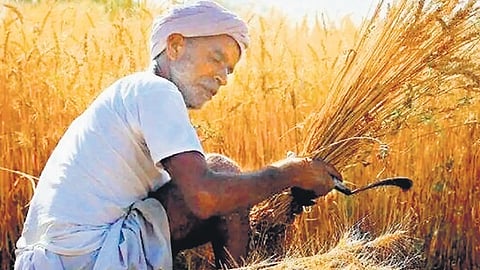

NEW DELHI: The government has issued an advisory to wheat farmers to safeguard their crops against rising temperatures and the increased possibility of heat wave conditions.
In this advisory, farmers are urged to maintain a moisture level of 12-13% in wheat during harvest and apply light irrigation if temperatures exceed normal levels.
The Indian Meteorological Department (IMD) has reported that maximum temperatures are expected to gradually increase by 2-3°C across many parts of the country, particularly in North India, and along the East and West coasts.
The Indian Institute of Wheat & Barley Research (ICAR-IIWBR) recommends that farmers in central and peninsular India ensure proper moisture content (12-13%) at harvest and undertake necessary cleaning for safe storage. Farmers in the northeast and northwest regions are advised to provide light irrigation as needed to maintain adequate soil moisture for crop maturity.
Dr. Gyanendra Singh, Director of ICAR-IIWBR, suggests that if the maximum temperature exceeds 37°C, farmers can spray 0.2 per cent Muriate of Potash or 2 per cent Potassium Nitrate mixed with 200 litres of water per acre during the post-anthesis stage of wheat to prevent crop desiccation and mitigate heat stress.
Additionally, farmers in hilly areas are advised to monitor wheat crops for diseases such as yellow rust or brown rust and apply pesticides such as Propiconazole 25EC. For this, one milliliter of chemical should be mixed with one liter of water, and 200 milliliters of fungicide mixed with 200 liters of water should be sprayed per acre of wheat crop.
The advisory emphasizes that only light irrigation should be applied to late-sown crops, and irrigation should be stopped 8-10 days before harvesting.
However, despite these challenges, the Ministry of Agriculture and Farmers’ Welfare has estimated wheat production to be 112.02 million tonnes (MT), which is about 1.46 MT more than last year, attributed to a 1.21% increase in the area sown compared to last year.